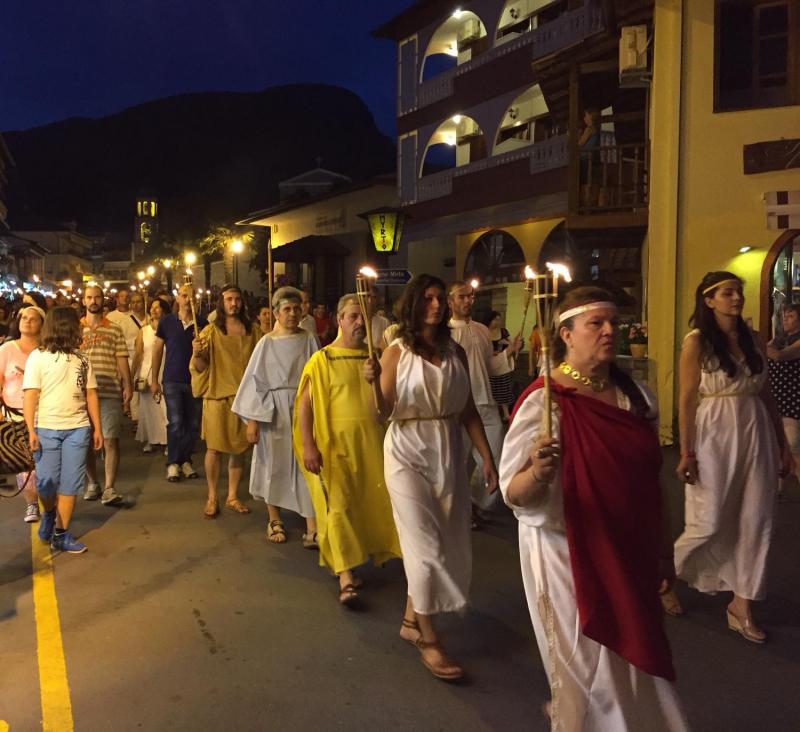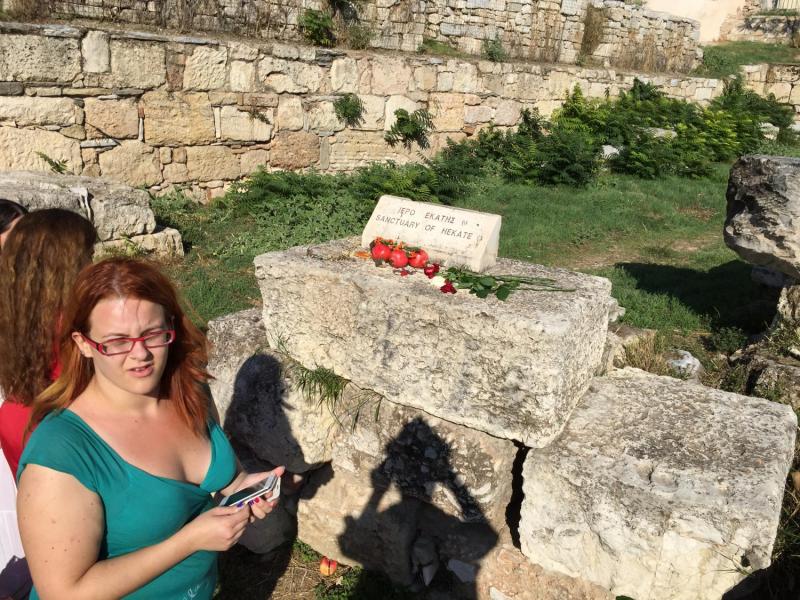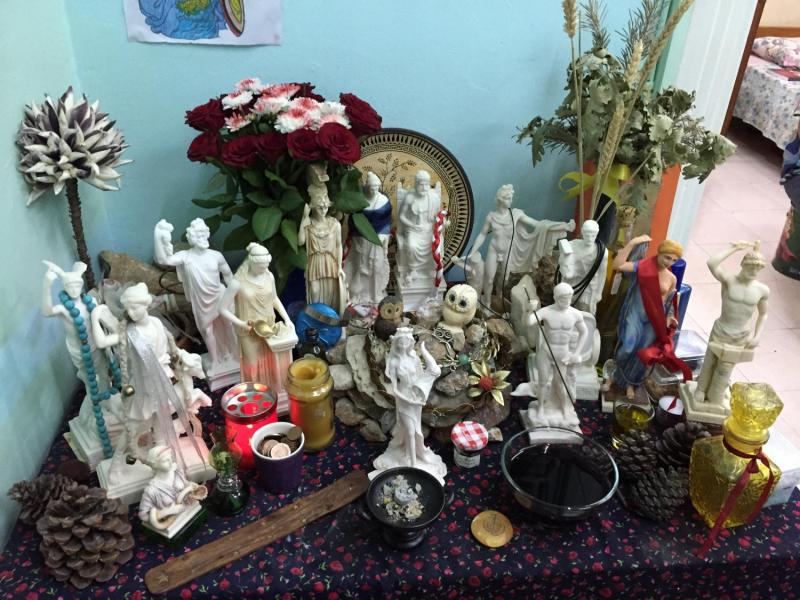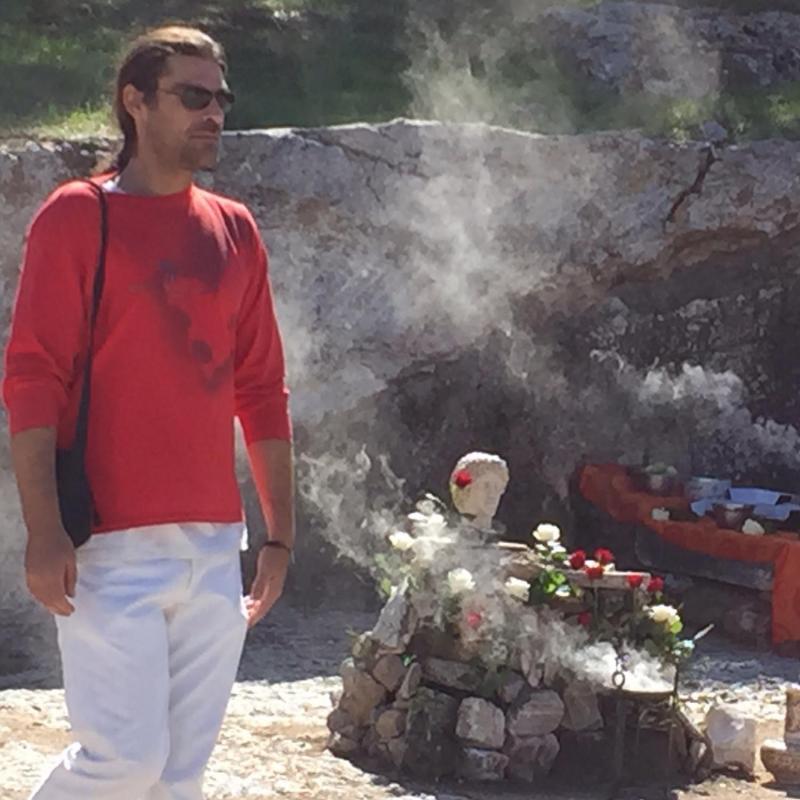1.

A week after over 60 percent of Greeks voted “Oxi”—no—on the troika’s austerity measures, thousands gather on Mount Olympus outside of the town of Litochoro to pray to the ancient gods.
The Greek civil war, the prototype of all the proxy conflicts of the Cold War, started here, when the communists came out of the mountain and attacked the police station in 1946. Now, in front of that same station, people are milling about in ancient chitons—the Greek equivalent of the toga—holding torches and talking on cell phones.
In Greece, the Orthodox church is written into the constitution. Litochoro is the only town to host such a large-scale public display of paganism, which is not recognized as a religion; “Hellenismos” is the word most often used by practitioners.
While some locals oppose the demonstration, others find power in the pageantry. People gather on the sides of the steep, winding streets and in the balconies, in the shadow of the mythical mountain, to watch this pagan procession pass by—the participants decked out in red and white, casting dramatic shadows on the whitewashed walls as the torches flicker and the sun sets.
“Zeus in, Zeus sten, Zeus exete, oh megale Zeus!” they chant as they make their way to the town’s amphitheater.
Aggrandized by a bright spotlight, actors perform a patriotic version of Greek history. Tales of the births of the gods are reserved for the private performance the following night on the mountain.
2.

The police just stopped Morgana, Danae, and Danae’s wife, Galena, as they walked with their small group of polytheists down the mountain from the Shrine of the Muses and told them they could not take a picture in front of any archeological site while dressed in Hellenic attire. Agli, a friend, walks behind with Alexandros—Danae and Galena’s child—and Idran, a mentally disabled man they care for. Morgana fumes over the lack of religious freedom and about what she calls fascists and their repression of polytheists. Her boyfriend, Demetrios, joins in. “But it is worse because they are Christian fascists,” he says.
Agli is working on a petition to have Labrys, an Athenian group of polytheists, recognized by the government as a religion. She has gathered fifty signatures and needs 300. “I just want to be legal,” she says.
Wandering the Plaka, they stop in a gift shop to look at the ancient statues, which hold religious significance for them—they’re not just kitsch. Suddenly, they realize that Alexandros and Idran are lost. Agli calls the police. Danae runs off in one direction, Galena in another in a frantic search. Finally Galena comes back with the two. Danae returns and embraces the child, lifting him up.
“You see what just happened,” Agli says. “This is the last day of the Eleusinian mysteries and they experienced the feeling of losing their child.” A few moments later she adds: “I called the police. But I also called Demeter. You see how this works? This is living mystically.”
In the ancient agora, Galena points out a pomegranate tree just across from the shrine of Hecate, three perfectly ripe fruits hanging red against the crisp blue sky. They have more in a bag and they begin to set up the altar in the shrine, cracking the fruit hard against the side of the stone so that it bleeds a stark red on the corner of a white rock.
They lay out pinecones and flowers and use an iPhone to look up the words to the ritual. They speak in a polyglot mixture of Greek, Spanish, and English.
“Thanks for putting me in your place, just for a minute,” Danae says in her prayer to Demeter.
3.

Luis grew up in a Muslim family in Venezuela and came to the ancient Greek gods through dreams. His mother understood, but when he told his father, he says, “He tried to kill me.” Like Galena and Danae, who are from Spain, Luis moved to Athens to be close to the gods. At a small birthday party for six-year-old Alexandros, Luis is wearing a shirt with an arrow pointing sideways and the words “I think he’s gay”—a protest against the homophobia that surrounds him. Danae and Galena are married in Spain, but in Greece, where gay marriage is not recognized, they are not. “They say, ‘When are you going to marry a man?’” Galena says, washing plates for Alexandros’s cake. “You want me to have some polygamy? I am already married,” she says.
But it is mostly worth it to be close to the gods. “It still has ancient Greece in it,” Danae says. They have a shrine to the gods at the top of the stairs and worship certain gods on certain days. “So tomorrow, Friday, is Aphrodite. We worship her with Eros, her son, but also with Adonis, her lover. Her other lover, Hephaestus, we worship with Athena.” Danae says they pair Zeus and Hera because “we want to even out the sexes since the ancients were not so good to women.”
4.

Pandion is one of the first to arrive at the Shrine of the Muses where his group, Labrys, worships on Sunday mornings. He wears a red shirt with a Greek battle axe on it and white pants. Strong jaw, flowing hair. “We wanted to have rituals and prayers and to form a bond that is not made on an ideological basis…but on a religious basis,” he says.
Labrys believes that contemporary polytheism is the sum of the religious beliefs and practices of those who follow the ancient gods. Without the religious and social restrictions in the country, Pandion says, half the population of Greece could come out as pagans in the coming years.
He begins to tend the stone altar that stays there—most of the time. Occasionally they arrive to find it knocked over, the rocks scattered. “I don’t know if it is security or what,” Pandion says.
When polytheistic followers Danae and Galena moved to Athens, they lived in an apartment right below Pandion’s, which they saw as symbolic. He would come down once a week or so to make sure everything was okay or ask them to coffee. Once, in a square, they spotted a priest, and felt sad and disgusted by what they see as the arrogance of the clergy, whom they call “cucarachas.” Then they saw Pandion walk up with his “beautiful hair.” “That is our priest!” Galena says.
This essay is part of our #VQRTrueStory project, a social-media experiment in nonfiction that delivers stories across platforms. Each week, a contributor takes over our Instagram feed, @vqreview, to post original dispatches that tell the stories behind the pictures. The dispatches are then published on our website, and two are selected for inclusion in each issue of the magazine. You can visit the #VQRTrueStory archive to read all the contributions so far. And be sure to follow @vqreview to keep up with the project as it unfolds.
1 Comments
My partner and i travel to Delphi and Santorini, Greece annually where we host yoga/meditation retreats. We have found many Greeks in Delphi still worship the ancient gods (Apollo, Athina and the Nymphs) through gatherings and rituals and we have experienced some unexplainable events however we are sworn to secrecy because of the oppression of relgious freedom.







